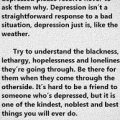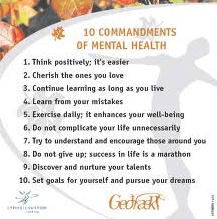Below is a link to a Depression Quiz. You might want to take it then come back here for more information about Depression – The Misunderstood Mood Disorder.
“Depression is one of the most tragically misunderstood words in the English language. Why? The term has two starkly different meanings, depending upon the context.”
The above text was taken from the link below:
?Depression: Tragically Misunderstood
“People who face depression must be prepared for at least two long journeys. One journey is to face depression itself. The symptoms of depression –despondency, lethargy, nightly insomnia, an inability to concentrate – are painful and difficult to manage. The second journey, is in many ways, harder, and often longer, which is to face other people’s misunderstandings of their depression, misunderstandings that are sometimes insulting, confusing, and often unhelpful in getting the symptoms under control.”
The above quote was taken from the article, Misunderstood Depression: the Human Toll.
Depression has a clinical term that relates to a physiological mental/mood disorder. It also can mean “I’m sad” about something. Anything: the weather, a friend’s comment, a missed opportunity.
A lot of research has been done to try and understand why Depression is so misunderstood. Can a person who is depressed just “get over it” and feel better again?
Hardly.
“The failure to diagnose depression is seen as acceptable even within health care,” said Marianne Udow, vice president of Blue Cross Blue Shield of Michigan. “Physicians often think that depression is something individuals can make go away.”
But a sad person will feel sad for a while, then go on with their lives. Their brain hasn’t been hard-wired to slip into the darkness that so many do with clinical depression. Or, what Freud used to all “melancholia.”
Fighting depression is a battle. Hard fought and sometimes a skirmish or two is won, but the battle never truly ends.
Even when treated, clinical depression often leads to further episodes or even suicide. Seventy percent of depression cases recur in five years, and suicide is the third most common cause of death for adolescents between 10 and 19 years old, according to the University of Pittsburgh Medical Center and Center for Disease Control and Prevention data.
The above quote was taken from Depression misunderstood even in medical profession.
From Depression: So Misunderstood we learn that: Americans do not believe they know much about depression, but they are highly aware of the risks of not receiving care, according to a survey released by the National Alliance on Mental Illness. 71% of the public sample said they are not familiar with depression, but 68% or more know specific consequences that can come from not receiving treatment, including suicide (84%).
There are ways to help, you or a loved one who may be suffering from depression. From the article, Depression is one of the Most Misunderstood Medical Conditions.
I found the following list. It could prove quite helpful.
What to (and what not to) say to her when she is depressed
DO SAY
1. Youre not alone in this.
2. You are important to me.
3. Do you want a hug?
4. You are not going mad.
5. I cant really understand what you are feeling, but I can offer my compassion.
6. Im not going to leave you or abandon you.
7. I love you (if you mean it).
8. Im sorry that youre in so much pain. I am not going to leave you. I am going to take care of myself, so you dont need to worry that your pain might hurt me.
DONT SAY
1. Theres always someone worse off than you are.
2. No one ever said that life was fair.
3. Stop feeling sorry for yourself.
4. So, youre depressed. Arent you always?
5. Try not to be so depressed.
6. Its your own fault.
7. I think your depression is a way of punishing us.
8. Havent you grown tired of all this me, me, me stuff yet?
9. Believe me, I know how you feel. I was depressed once for several days.
How to tell she is suffering from depression:
The typical clinical signs of depression are: sadness, crying, self-isolation, distractedness, irritability or aggression, sleep deprivation or oversleeping, loss of appetite or binge eating, lack of interest or motivation, low energy, state of anxiety and low self-esteem.
Severe forms of, or untreated, depression may lead to suicidal thoughts and attempts.
At times, depression may manifest as a physical discomfort such as headaches or pain elsewhere in the body when the person does not psychologically release anxiety.
Depression seems to go hand in hand with the creative. We tend to isolate ourselves from the outside world while we create imaginary worlds within our minds. Sometimes those worlds are fun, other times they are scary and tragic.
I wandered across the following blog post. It was so interesting I thought I’d include it here for you to read yourself.
From the above link: “Now lets look at depression. One of its most salient attributes for this discussion is that it tends to make people want to isolate themselves, and makes it hard for the depressive to connect with others.
At least, not in the normal way. But perhaps, through writing? That way the over-stimulating, frightening others are kept safely far away, and the writer can mostly engage with their richly detail inner life.
Thus, the others are a largely imaginary inner audience, and this provides enough distance for the writer to write for an audience which is mostly a reflection of their own imagination and standards.”
http://michaeljohnbertrand.com (http://s.tt/1wTC2)
Small Wonders and Other Thoughts is a blog by Megan. She has battled with depression and writes about it and how it affects her life.
What makes Depression so misunderstood? Because it’s so hard to pin down in most people. It takes weeks, months, and even years before a correct diagnosis can be made. All the while, the person battling the depression must battle their demons alone, with no help until a correct diagnosis and treatment plan can be devised.
This topic is very dear and near to me. I have Bipolar Disorder and battle with Depression constantly. I am mostly stable.
Who is, really?
And, I owe it all to my Wellness Recovery Action Plan. It helps me stay in touch with my emotions and physical conditions. It helps me identify triggers and how to deal with them swiftly before they develop into full blown episodes. This plan is a living, breathing entity. It gets updated constantly and I use it on a daily basis. Check out the link above to find a way to create your own Wellness Recovery Action Plan.

Positive Thoughts. Positive Lives.


